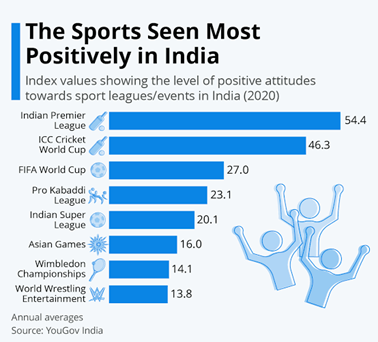Sports can be a force for behavioural change in society
Sports folks should take up the cause of fighting drug addiction and exercise their mass influence
Relevance
- GS Paper 1 Salient features of Indian Society, Diversity of India.
- Tags: #gspaper1 #indiansociety #sports #behavioralchange.
Why in the news?
- Sports can be a panacea for the drug problem because they provide a healthy and positive outlet for young people, teaching them important life skills such as teamwork, discipline, and perseverance. Sports can also help to build self-esteem and confidence, making kids less likely to turn to drugs for comfort or escape.
- For example, sports can help to reduce crime and violence by providing young people with a positive outlet for their energy and competitive spirit. Sports can also help to promote social inclusion and integration by bringing people from different backgrounds together.
- Additionally, sports can be a powerful tool for raising awareness of important social issues. For example, many athletes have used their platforms to speak out against racism, sexism, and other forms of discrimination.
Sports as a Catalyst for Societal Change
- Symbolic Power of Sports: Tommie Smith and John Carlos used the podium at the 1968 Olympics to make a powerful statement, showing that sports can be a platform for social messages.
- With a Hindi slogan, Sony Sports network for the Asian Games, “Iss baar 100 paar ( this time, more than 100),” it has galvanized the aspirations of not just our athletes, but the whole nation.
- Emotional Engagement: Sports is known for generating intense emotional energy, akin to successful social movements. It can evoke powerful emotions, making it a potent tool for driving change.
- Strength in Small Groups: Successful social movements often thrive in small, intense groups rather than relying solely on mass media. Similarly, sports teams operate as tight-knit, focused groups.
- Diversity and Inclusivity: Sports encompass various disciplines and team events, making them accessible to people from diverse backgrounds. It can unite people from different walks of life.
- Clear Purpose: Effective social movements have a specific cause or goal. In this context, combating drug addiction can be the purpose that Indian sports takes on, given its growing prevalence.
- Olympic gold medalist Benita Fitzgerald Mosley’s Insight: She believes that sports reveal qualities like leadership, strategy, teamwork, and competitiveness within everyone. This insight prompts the question of whether sports can extend beyond business and catalyze societal change.
Sports as a Solution to Drug Addiction
- Targeting Teenagers: Studies suggest that keeping teenagers away from drugs until their prefrontal cortex matures around the age of 23-24 significantly reduces the risk of addiction. Sports can provide a healthy alternative.
- Role of Law enforcement agencies: While Addressing Drug Supply, Indian law enforcement is working to reduce the drug supply. Demand side of the problem is a cause to worry which is handled by Law enforcement agencies. Even the formidable U.S. administration has struggled to effectively combat the supply of illegal drugs within America.
- Emotional Stimulation: The emotional intensity of sports, even at the inter-school level, can act as a powerful deterrent to drug abuse among teenagers.
- Sports as a Positive Influence: Sports have the potential to redirect teenagers’ focus away from drugs. They can act as a responsible influence, akin to the prefrontal cortex, guiding them towards appropriate behavior.
- Building Social Connections: Loneliness is a significant driver of drug abuse among teenagers. Sports inherently fosters social connections, offering a solution to combat social deprivation.
- Emotional Highs vs. Drugs: Sports can provide emotional highs that rival or surpass the appeal of drugs, offering a healthier and more fulfilling outlet for teenagers.
- Antidote to Drugs: By engaging teenagers in sports, society can divert their attention away from drugs and guide them toward responsible behavior.
Conclusion
- Sports for Societal Behavior Change: Sports, beyond its focus on winning medals and business potential, has the capacity to address societal issues like drug addiction, thus acting as a positive force for change.
- Sports Beyond Medals and Money: Tommie Smith and John Carlos’ raised fists illustrate that sports have a broader purpose than medals and profits. Sports today can indeed drive societal behavior change and combat issues like drug addiction—an emphatic ‘yes.’
|
Key highlights of sports in India In recent years, India has made significant progress in a number of sports, including athletics, wrestling, shooting, badminton, and hockey. The country has also seen a growing interest in other sports, such as football and tennis. ● The success of Indian athletes at the Olympics and Asian Games. ● The growing popularity of the Indian Premier League (IPL), the world’s most popular cricket tournament. ● The launch of new professional sports leagues, such as the Pro Kabaddi League and the Indian Super League (ISL). ● The increasing investment in sports infrastructure and development programs. ● The rise of new sporting stars, such as Neeraj Chopra, PV Sindhu, and Virat Kohli. ● The success of Indian sport in recent years has had a number of positive benefits for the country. Sport has helped to promote national pride and unity, and it has also inspired a new generation of Indians to take up sport. Sport has also played a role in promoting economic growth and social development in India. The future of sports in India is very bright. The country has a young and talented population, and there is a growing interest in sport at all levels of society. With the continued investment in sports infrastructure and development programs, India can expect to achieve even greater success in sport in the years to come. |
Source: Livemint, Newsdairyonline, UNODC
Mains question
Discuss the role of sports in promoting societal behavioral change. Give examples.




